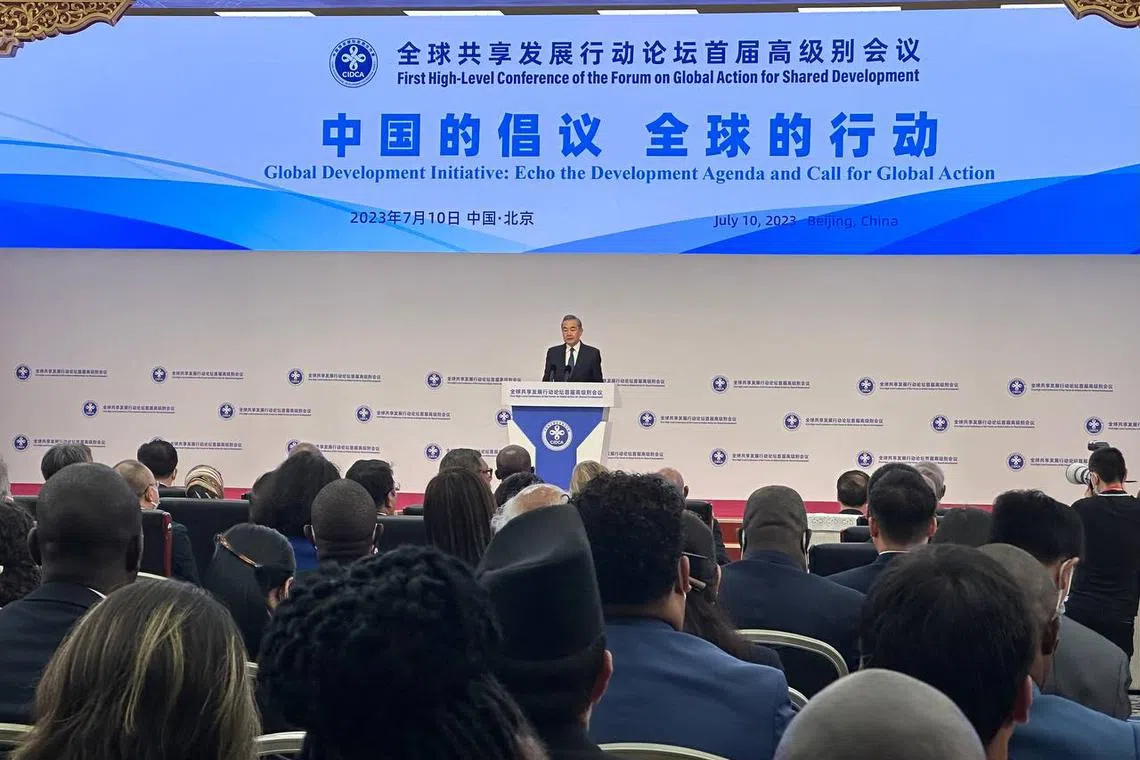China announces 11 foreign aid projects to court developing countries
Sign up now: Get insights on Asia's fast-moving developments

China's top diplomat Wang Yi speaking at the Global Development Initiative forum in Beijing on Monday.
ST PHOTO: LIM MIN ZHANG
BEIJING - China will undertake 11 new foreign development projects – including for infrastructure, such as power plants, a community hospital and public transport – co-funded by receiving countries under the Global Development Initiative (GDI), top diplomat Wang Yi announced on Monday.
Funding for the projects will also come from China’s foreign aid agency, and will involve resources from the private sector, and social and international organisations, he said, as Beijing continues efforts to court developing countries and pitches itself as a champion for global development.
“No matter how the international situation may evolve, China will stay true to its status as a developing country, and stand firmly side by side with fellow countries of the South for shared development and joint revitalisation,” Mr Wang told an international forum, whose audience included leaders from developing countries.
The GDI, launched by President Xi Jinping in 2021, seeks to contribute to making progress on the United Nations’ 2030 Agenda for Sustainable Development. The UN agenda includes goals such as poverty reduction, quality education, gender equality and combating climate change.
Chinese officials have said that more than 100 countries and international organisations have expressed support for the GDI, which is seen as complementary to the decade-old Belt and Road Initiative (BRI) that has resulted in more than US$1 trillion (S$1.35 trillion) of infrastructure projects overseas to date.
The 11 projects announced on Monday include a windmill in Uzbekistan and a hospital in Ecuador, and are expected to strongly promote the economic and social well-being of the recipient countries, said Ms Tang Ying, director of the Global Development Promotion Centre, which is under the China International Development Cooperation Agency (Cidca).
Reception to China’s foreign overtures, which have grown under Mr Xi’s leadership, has been mixed.
While the BRI has provided much-needed infrastructure from railways to ports, other countries have been more wary of closer ties with Beijing, given outstanding bilateral issues such as overlapping maritime claims in the South China Sea.
The GDI has also been criticised for being a tool for China to shape international rules and norms to its advantage. In response to the “viewpoints of some Western countries”, Mr Zhao Fengtao, vice-chairman of Cidca, said GDI aims to align and accelerate the UN’s 2030 Agenda, which represents the broadest consensus on the issue of development.
“So, it is fair to say that any country without harbouring any bias or political motivation and any country in support of the UN Sustainable Development Goals has no reason to oppose the GDI,” he told reporters at a media briefing last week ahead of the forum.
The one-day event was organised by Cidca, which coordinates the country’s foreign aid efforts. It was attended by Chinese officials, foreign leaders and representatives from international and non-governmental organisations such as the Bill & Melinda Gates Foundation. Topics discussed at the event – officially called the First High-Level Conference of the Forum on Global Action for Shared Development – included how poorer countries can gain a bigger share of financing for green projects, and ways to reduce poverty.
Assistant Professor Stefanie Kam of the S. Rajaratnam School of International Studies believes Mr Wang’s reference to the UN’s 2030 Agenda showed China’s willingness to engage as an active participant in international regimes. He had also referred to the agenda in his speech.
It is also to credibly advance its international development agenda under the framing of South-South cooperation, she said, referring to exchange of expertise between developing countries.
Cidca, which emerged as the lead coordinating body of Chinese foreign aid in 2018, is meant to help China achieve the diplomatic and tangible goals of the BRI, said Prof Kam, who specialises in Chinese politics. The GDI, as implemented through the Cidca, could also help to push back against narratives of Beijing’s debt trap diplomacy, she added.


